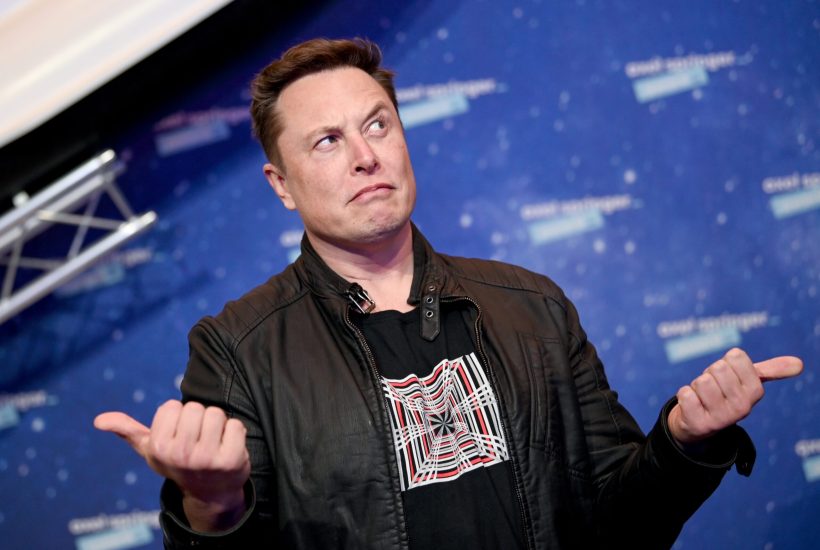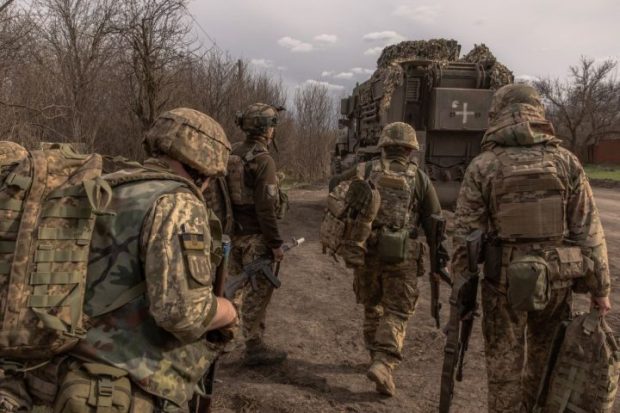The power one person can hold should never be underestimated. They can take people’s lives, as Vladimir Putin does, or save them as Elon Musk did in Ukraine. Two days after Putin’s invasion, Ukraine’s minister for digital transformation, Mykhailo Fedorov, tagged Musk on Twitter and asked him to help Kyiv with Starlink. The communication centres were one of the first targets for Russian missiles. ‘While you try to colonise Mars, Russia tries to occupy Ukraine! While your rockets successfully land from space, Russian rockets attack Ukrainian civil people!’ tweeted Fedorov. The answer was immediate. Musk tweeted: ‘Starlink service is now active in Ukraine. More terminals en route.’
It was stunning – and transformative. Kyiv received the first 500 Starlink devices – satellite dishes and routers, which are set up to receive the signal from space – in a matter of days. Today, Ukraine has about 20,000 Starlink devices and 50 Tesla Powerwall batteries, which provide the government and the military with communication in the most dangerous parts of the frontline. The US government might have paid for it, but Musk was a hero – someone who reached out to help in the darkest times.
Things changed last week, with Musk starting a Macron-style discussion on Twitter about which territories Ukraine should give up to Russia in order to reach a peaceful solution (polls show 87 per cent of Ukrainians think the answer to that is zero). The whole world denounced as a farce the sham ‘referendums’ that followed the annexation of Ukraine’s regions – 18 per cent of the country. But Musk held a Twitter poll on his proposed ‘peace’ plan, as follows:
Ukraine-Russia Peace:
– Redo elections of annexed regions under UN supervision. Russia leaves if that is will of the people.
– Crimea formally part of Russia, as it has been since 1783 (until Khrushchev’s mistake).
– Water supply to Crimea assured.
– Ukraine remains neutral.
— Elon Musk (@elonmusk) October 3, 2022
After 2.7 million votes on his poll, Twitter users were split about 40/60 – most answered ‘no’ to Musk’s proposals. But Ukrainians were shocked: here was Musk proposing to reward Putin’s aggression. Even Macron didn’t go this far. Volodymyr Zelensky asked people which Musk they liked better: the one who supports Ukraine or the one who supports Russia.
If a peace deal were remotely plausible, it would have some support in Ukraine. In February, Zelensky was offering Kyiv’s neutrality to stop the war. He was ignored – Russia demanded to ‘demilitarise and de-nazify Ukraine’. Everybody in my country believes that Putin won’t stop after gaining a few pieces of Ukraine – he needs all of it. We have learned the hard way that only the expulsion of Russian forces will do.
Thousands of comments from world politicians and Ukrainians did not stop the discussion, with Musk publishing yesterday the map of the results of the 2012 parliamentary elections, in which eastern and southern regions of Ukraine voted for the pro-Russian president Viktor Yanukovych and his party. Of course, such elections took place before the Maidan Revolution and Russian aggression: public opinion has since transformed. Secondly, at the beginning of 2014, the survey showed that only 24% per cent of people in the Luhansk region and 33 per cent in the Donetsk region wanted to join Russia.
But as soon as Putin started to bomb civilians in order ‘to protect them from Kyiv Nazi’ and burn their cities to the ground, that percentage dropped to 3 per cent. Now Ukrainians want nothing in common with Russia – the last survey showed that support for joining Nato (83%) and the EU (86%) is currently the highest in the history of Ukraine’s independence.
The fallout from Musk’s statements may be larger than it seems now: our former Starlink saviour has somehow become the voice calling loudest for appeasement. The Ukrainian army finally started gaining big victories on the frontline. This counteroffensive was possible, not just because of the bravery of Ukrainian soldiers, but thanks to the support from the West. The more world leaders see Ukraine’s victory as optional, the lower the chance of Kyiv accomplishing it.
There’s a photo that has haunted me for days (too gruesome to publish here but it’s on social media) taken at a mass grave in near liberated Izyum. This is why Ukrainians fight: we know the alternative. Perhaps Musk can come to Kyiv and see for himself just how high the stakes are, and why the deal he hawks on Twitter could never lead to lasting peace.
Got something to add? Join the discussion and comment below.
Get 10 issues for just $10
Subscribe to The Spectator Australia today for the next 10 magazine issues, plus full online access, for just $10.
This is taken from this week’s Ukraine in Focus newsletter. Sign up for free here.



















Comments
Don't miss out
Join the conversation with other Spectator Australia readers. Subscribe to leave a comment.
SUBSCRIBEAlready a subscriber? Log in